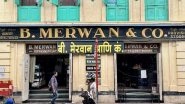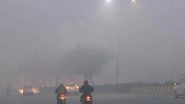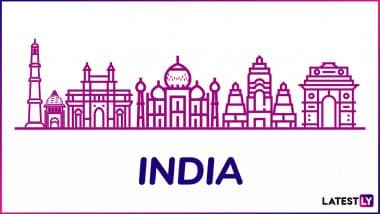New Delhi, May 25 (PTI) The top 10 hotspot cities reporting the highest number of COVID-19 cases in the country will be covered in a serosurvey to estimate the prevalence of community transmission of the infection, according to protocols drafted by researchers from the Indian Council of Medical Research (ICMR) and other agencies.
Besides, the survey would also be conducted in 60 districts of 21 states and Union Territories categorized into four strata -- zero, low, medium and high -- according to the reported COVID cases per million population, as per the protocols for community-based surveillance published in the IJMR (Indian Journal of Medical Research).
Also Read | Coronavirus Deaths in Mumbai Cross 1,000-Mark, COVID-19 Tally Reaches 31,789.
Among the top 10 cities reporting the maximum number of cases are Mumbai, Delhi, Pune, Ahmedabad, Thane, Indore, Jaipur, Chennai and Surat.
The protocols -- titled ‘National sero-surveillance to monitor the trend of SARS-CoV-2 infection transmission in India: Protocol for community-based surveillance -- for carrying out the survey was published in the IJMR on Sunday.
The ICMR said in a statement that the household-level cross-sectional survey will cover 24,000 adults distributed equally across four strata of districts -- 15 districts from each category.
Sero-survey involves testing of blood serum of individuals to monitor trends in prevalence of the SARS-CoV2 at district level.
"The trend of seropositivity will also be looked at to monitor the community-level transmission. Pooled seroprevalence from the group of districts for each of the four strata will be used to estimate the prevalence of COVID-19 infection in the country," according to the protocols.
The initial survey would serve as a baseline to determine the sero prevalence of SARS-CoV-2 infection in the community and in high-burden cities as well, while the subsequent rounds would help to monitor the trends of infection in the community.
The findings of the survey will also guide the strategy for making decisions related to lockdown options at district level, the document said.
"The objectives of this serosurveillance are to estimate and monitor the trend of seroprevalence for SARS-CoV-2 infection in the general population and high-burden cities, determine the socio-demographic risk factors for the coronavirus infection and delineate the geographical spread of the infection in the general population and hotspot cities," the ICMR said.
The ELISA-based antibody tests would be used and data collection will be done using a mobile-based application.
"The results of the survey will provide information about spread of SARS-CoV-2 infection in different parts of the country. As a part of the study, people from red, orange and green zones in a district will be tested for COVID-19 at random to check whether they have developed antibodies against the infection even though they remained asymptomatic or showed mild symptoms," an expert associated with the survey had said.
The survey will involve collection of venous blood samples from 400 randomly selected individuals (one per household) from 10 clusters in each district, the official had said.
Explaining the procedures to be followed, the document stated that the study team will visit the randomly selected households and brief them about the survey objectives and process involved.
After obtaining written consent, information on basic demographic details, exposure history to laboratory-confirmed COVID-19 cases, symptoms suggestive of COVID-19 in the preceding one month and clinical history will be recorded, it said.
A nationally representative serosurvey with multistage sampling design will be useful to identify the most affected areas and provide crucial data to develop epidemiological models to predict the trajectory of COVID-19, the document said.
Instead of waiting for the end of the epidemic, repeated serosurveys carried out at regular intervals can be a useful tool to monitor the epidemic precisely, it said.
The survey is being conducted by the ICMR, New Delhi, in collaboration with the Department of Health, the National Centre for Disease Control with support from state health departments and key stakeholders, including the WHO.
The survey is coordinated by ICMR's National Institute of Epidemiology (NIE) and National Institute of Research in Tuberculosis (NIRT), Chennai. PTI PLB
(The above story is verified and authored by Press Trust of India (PTI) staff. PTI, India’s premier news agency, employs more than 400 journalists and 500 stringers to cover almost every district and small town in India.. The views appearing in the above post do not reflect the opinions of LatestLY)













 Quickly
Quickly


